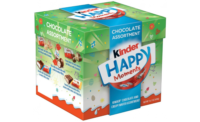As of 9:00 p.m. on Jan. 25, 2009, the Centers for Disease Control and Prevention (CDC) confirmed that 501 people from 43 states, and one person from Canada, have been infected with the outbreak strain of Salmonella Typhimurium, found in peanut products manufactured at a Peanut Corporation of America (PCA) plant in Blakely, Ga. Out of those 502 people, 108 were hospitalized. Additionally, eight deaths have been reported, which may be associated with the outbreak strain, stated Dr. Robert Tauxe, deputy director, division of food borne bacteria and mycotic diseases, CDC, in a FDA/CDC joint media teleconference.
On Jan. 30, 2009, the U.S. Food and Drug Administration (FDA) confirmed that its Office of Criminal Investigations is involved in a Justice Department investigation of PCA.
Upon inspection of the Blakely, Ga. plant, the FDA, CDC and the Georgia Department of Agriculture made multiple observations regarding deficiencies in manufacturing equipment, cleaning programs and Salmonella or crop contamination. After the investigation of the plant, the inspectors issued a FDA 483 document listing the company’s good manufacturing deficiencies.
According to the document, inspectors found Salmonella Typhimurium in peanut paste, along with Salmonella Anatum in peanut butter, peanut meal and medium chopped granules and Salmonella with no strain identified in various peanut products. The only strain found to cause human illness is Salmonella Typhimurium.
“Specifically, the team identified approximately 12 instances in 2007 and 2008 where the firm, as part of their own internal testing program, identified some type of Salmonella and released a product after it was retested, in some cases by a different laboratory,” Michael Rogers, director of the division of field investigations in the office of regulatory affairs, FDA, said in the media teleconference.
In other words, before the investigation, PCA conducted its own private laboratory testing and found certain lot numbers of its peanut products to be contaminated with some form of Salmonella. These products were then retested, where they received a negative result, and shipped in interstate commerce, according to the FDA.
PCA issued a statement in response to this allegation saying, “PCA uses only two highly reputable labs for product testing and they are widely used by the industry and employ good laboratory practices. PCA categorically denies any allegations that the company sought favorable results from any lab in order to ship its products.”
Additionally, the FDA 483 document states that the listings are “inspectional observations” and do not represent a final agency decision regarding the final classification of the facility.
In turn, PCA plans to respond to the FDA rejecting some of its observations.
PCA has voluntarily recalled all of its peanut products manufactured at its Blakely, Ga. plant. The company’s web site lists the products affected (www.peanutcorp.com). Manufacturers can also visit the FDA’s site,www.fda.gov, for a searchable list of the products that have been recalled or the NCA’s site,www.candyusa.com, for a list of products that have been declared uncontaminated. Neither of the listings is verified by the FDA and both are updated regularly.
If a manufacturer believes it has received products from PCA, the company suggests its customers segregate and hold the products and call PCA at (877) 564-7080 for further instructions. The FDA, NCA and PCA encourage manufacturers to inform their consumers of whether or not their products are impacted by the PCA recall.
Reporting safety
Whilewww.fda.govandwww.peanutcorp.comindicate which peanut products have been recalled, they do not tell consumers or manufacturers which products have been identified as safe and uncontaminated.
The National Confectioners Association’s web site,www.candyusa.com, features a table consisting of information sent in from the companies whose products are not impacted by the PCA recall.
“Just because a company is not on the table does not mean that their products aren’t safe,” said v.p. of regulatory affairs for the NCA, Alison Bodor. “It just means that for one reason or another, they have not supplied us with information.”
The listing is updated whenever the NCA receives new information from a company.

Caotech's Jeffrey Kloppenburg (left) and Olaf Schepel in front of a chocolate production line within the company's recently expanded premises.
Supplier News
Caotech completes expansion effortWormerveer, Netherlands-based Caotech, a specialist in self-developed ball mills and conches within the cocoa and chocolate-related processing sector, has completed the expansion of its offices and production facilities, which was prompted by 30% annual sales growth during the past few years. Office space has been doubled, while the production facilities were expanded by 250 square meters, including the addition of a new logistics center to better serve customers.

Delkor Systems, based in Circle Pines, Minn., has introduced a new carton closing machine, theKapstone, which accurately positions, closes and seals cartons at line speeds up to 150 units/minute. A precise servo-driven positioning mechanism introduces “intelligent positioning” to the closing operation, thereby ensuring the consistent and reliable production of symmetrically sealed, squared-off cartons.Kapstone’s simplified no-lug design reduces maintenance downtime and facilitates cleaning and changeover processes. These innovations contributed to the decision of Cargill, Inc. to select theKapstone unit for production ofTruvia cartons, its new zero-calorie natural sweetener product.




